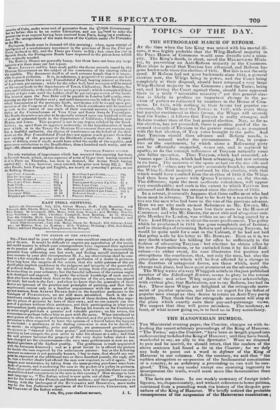TO TIIE EDITOR OE THE SPECTATOR.
Sit-I have read in your valuable paper some excellent remarlis on the sub- ject of the arts. It would be difficult to express my approbation of the manly
and candid manner in which your correspondents have expressed their opinions
on the practice of jobbing and the influence of jobbers. Being unavoidably prevented from addressing you last week, and finding myself anticipated in some measure by your able correspondent AI. J., my observations shall be con-
fined to a few remarks on the practice and profession of a dealer in pictures. It has long been the surprise of the artists, that the noble patrons of the art eliould place implicit confidence in the judgment and integrity of the generality of professed dealers. To detail the mischief arising from this practice, would be encroaching on your columns ; but the baneful influence of the custom ought
to hr developed and exposed. To prefer the critical knowledge of such men to those who have devoted their lives to the practice of the nit, seems too absurd for belief; but such is the fact : and when we know that the generality of these dealers are ignorant of the practice and principles of painting, and that their *Tomcats consist only in a familiar acquaintance with the names of the ancient matters, from ALBERT Du HER down to the humblest performer in the Catalogue of PILKINGTON, we are still more astonished. Such is the ex- traordinary confidence placed in the judgment of these dealers, that they regu- late the prices of pictures by laws of their own ; and no one scarcely can dis- pose of a picture without their assistance, and their participating in what your correspondent justly stigmatizes as a job. During his travels on the Continent, In artist might purchase a genuine and valuable picture ; on his return, his circumstances perhaps induce him to part with the same. When introduced to soine.patron of the arts, the performance is admired, arid the price being named, permission is then requested to have the opinion of a friend before the bargain ? concluded : a gentleman of the dealing connexion is sent for to decide on nierits : its oriyinality, price and quality, are pronounced questionable ; the picture is " danmed with faint praise," and returned thus disappointed, necessity at last compels the poor artist to take his chance at a sale ; and One the said picture becomes the property of the very dealer before stated : hut bow changed are the circumstances—the very same performance is now an un- doubted specimen of the highest quality. The gentleman is made acquainted with the fortunate discovery ; and as a great favour lie is offered the picture for double the sum required by the unfortunate painter: but an the following Innocent maintuvre is toot generally known, I beg to state, that should any 'sur- prise be expressed at the additional two or three hundred pounds, the reply will be, that a brother dealer had suffered the sum now required, to sell it again. The bargain now terminates, by taking from the unsuspecting purchaser some hun- dreds ef pound*, and transferring the sum to the pocket of a jockey in pictures. Under these and otbet connected circumstances, bow is it possible there can exist **established and correct taste in the arts in this country? How strange ten bear Mb language' "The Italian school is now quite out of date." The rage is SOW for the works of the Flemish and Dutch masters ; and their performances in history, with the landscapes of the RUYSDAELS and llomuSIAS, must make Pay for the less fashiontede specimens of the CARRACCIS, CORSZOLOS, and tht CLAUDIO of the Italian school.
1 am, Sir, your obedient servant, J. L.


























 Previous page
Previous page